As one of the organisers of the QED conference, I was understandably concerned when, a few days after Christmas, we received a notification explaining that we had committed copyright infringement. The issue concerned a blog post we published on the 21st of September, when we introduced the “Let’s actually talk about sex panel”, which – according to the legal letter we received – included a header photo without due credit to the image owner.
The legal threat read as follows:
You are receiving this legal infringement notice from Nationwide Legal Trademark Department due to the unauthorized usage of our client’s image.
The use of this image : https://i.imgur.com/4MkrZVH.png on this page: https://qedcon.org/news/2022/lets-actually-talk-about-sex is fine, as long as our client (LustGasm) is fully credited.
The credit must appear under the image or the footer of the page and be clickable to https://www.lustgasm.com/ within 5 working days. We await your response to confirm this has been completed, removing the image does not resolve the case.
Failure to do so in this time frame, will result in legal case (No. 84827) proceeding under the Digital Millennium Copyright Act’s Section 512(c) (” DMCA”) for past and or current usage.
Past usage of the image can be seen in the records on Wayback Machine (https://web.archive.org) – a permanent public archive of the web, which will be called upon as evidence in this case.
This email serves as the required official notice.
Regards
Julia Frank
Trademark Attorney
Nationwide Legal
401 Congress Ave. #1540,
Austin, TX 78701
[email protected]
www.nationwidelegalservice.org
We take the law very seriously at QED, and we take copyright infringement seriously too. The last thing we’d want to have done is to inadvertently steal an artist’s work, but we’re also a not for profit conference who can’t afford to pay commercial rates for a Getty Images license, so we’re heavily reliant on free imagery.
We actually face the same issue with this very magazine – providing each article with a suitable and royalty-free image is a challenge. Sometimes that means turning to Google image search, and setting the filter to copyright free, and seeing what comes up, but that’s not always reliable as sometimes people label things as copyright free when they aren’t. Could we have inadvertently stumbled into something like that at QED? It’s not impossible.
Except, something about this particular legal approach seemed off. For one, where it provides an example of the copyrighted image, it links to a copy of the image on imageUR, the free image hosting site. This seems rather an odd thing to do for a legal company. Haven’t they their own place to host it? And even if they don’t, why wouldn’t they just attach the image to the email they sent us rather than upload their copyrighted image to a free website where other people could see it devoid of any copyright marks. In attempting to remedy the situation, they may well have just multiplied their problem.
It also seems odd that the legal notification stated that evidence of us using the image can be seen in the records on Wayback Machine… but the link provided was to the homepage of the Wayback Machine. Which is a bit like writing “more information can be found on Wikipedia”, and linking to the homepage of Wikipedia.
Plus I was a little confused to see it reference legal case “no. 84827” – that seems rather an odd numbering for a legal case. In what country is the case with that number filed? If the US, in what state? And what year? There’s nothing other than a five digit number to work with, which would give a maximum of 100,000 numbered cases. I’m no expert, but I don’t think legal case numbering works this way, and I am fairly sure there have been more than a hundred thousand court cases. There’s even been more than 100,000 copyright or DMCA court cases. I’m also surprised that our case has a number when, so far, all we have is, at best, a letter before action.
For a copyright claim assertion, it seemed strange that at no point in the legal letter was there any attempt to demonstrate that the copyright was actually held by the company they’re representing. Which is almost certainly because the client they’re representing does not hold the copyright as claimed. We know that, because we got the image from Pixabay, the royalty-free stock image site, and it was originally taken by KlausHausmann. It appears to be part of a series of medicinal products he’s taken and uploaded to the site – including hand sanitisers, masks, disinfectant, syringes, and toilet roll.
That’s not to pigeon-hole Klaus’ art – he’s also taken series of cats, dogs, guys dressed as Santa, landscapes, and quite a few bare bums with flowers held between the cheeks. He has range. But he also has community spirit, and so he makes these images freely available on a license that, crucially, specifies that it does not require attribution.
Whereas, the legal letter was demanding attribution for their client. Specifically, for an online sex toy reviewer called “LustGasm”. The threat demanded that the credit must take the form of a clickable link through to the LustGasm website. But it did not include any proof that lustgasm own the image. So I took the image, pasted it into TinEye, the reverse image lookup engine, and found 39 instances of the image online… none of which were on the Lustgasm site. It’s possible that they own the rights to an image that they’ve not used, but it still seemed like something of a red flag.
Further, we were told that removing the image won’t resolve the case. This makes very little sense –if this is a notification of copyright violation, and all they want is credit, removing the image clearly would resolve what they’re asking for. Or, if we were to remove the image, would they still demand there is a link to their site, even though there’s nothing there to credit. What if we removed the QED site altogether? Are they arguing that we must keep the QED site operational so that it can include a link to their client’s site? It all seemed rather ill-thought-out.
Nationwide Legal Services
Given the red flags, I decided to look into who this email came from. According to her email footer, Julia Frank is a Trademark Attorney with Nationwide Legal. I went across to their website, which appears to be a fairly boilerplate website for a legal firm. It lists areas of expertise: corporate disputes, copyright litigation, personal injury, arbitration, divorce and property. Scrolling down their page, we even see a photo of Julia Frank, though she’s listed as Civil and Personal Injury Law.

Maybe she was covering for someone – it was, after all, Christmas. Presumably for her colleague Bob Rice, who is apparently the Real Estate and Copyright Law specialist. Or maybe she was covering for Victoria Boyd, who is the Criminal Law/Copyright Law specialist. Apparently, it’s routine for employees of this firm to specialise in two vastly different areas of the law.
Julia’s background is pretty mixed. According to her company profile:
Julia Frank focuses her practice on first-party assets and defense against personal injury and no-fault cases. She has previous courtroom research and drafting experience.
Julia worked as an attorney at the institutional and retail and overall real estate law office before joining Nationwide Legal Services, where she assisted colleagues in real estate disputes, including the preparation of case documents, false allegations, property audit inspections, and all other legal issues related to real estate.
Reading her bio, it does rather sound like Julia assisted colleagues in the preparation of false allegations – which, as it transpires, might be the most honest sentiment published on her website. Curiously, Julia’s profile page lives on the URL “nationwidelegalservice.org/attorneys/janet-harwood/”.
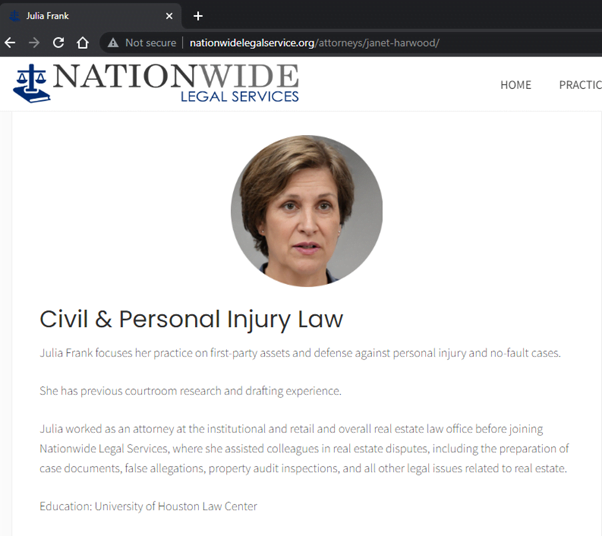
It’s not the only error on Julia/Janet’s website, either: their “Corporate Disputes” page, which has the URL “nationwidelegalservice.org/practice-areas/medical-malpractice/”, reads:
Our lawyers can give legal advice or recommendations to the concerned parties and act as the mediators in any case.
At Thornton Sims we have expanded to offer multiple types of corporate litigation services. We have also seen a been rapid growth in the number of personnel required for the corporate sector.
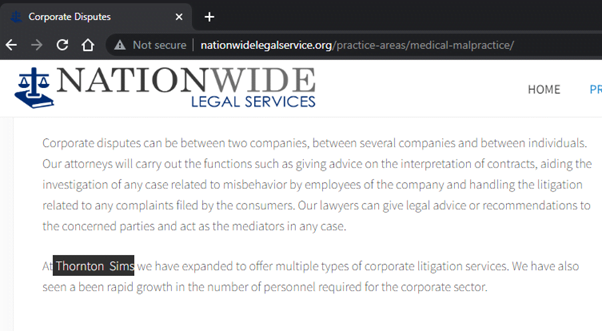
Who are Thornton Sims, you might well be asking, and is it Julia or Janet that works for them? Confused, I decided to give Julia/Janet a call for myself, as her number was right there on her company website. Sadly, each time I called it, the call rang for a while and then dropped, as if the number wasn’t real.
It gave me cause for concern, so I looked into when the website for Nationwide Legal was registered – according to Whois, it was registered on the 6th of December 2022, just 22 days before they issued QED with a copyright notice on behalf of Lustgasm.
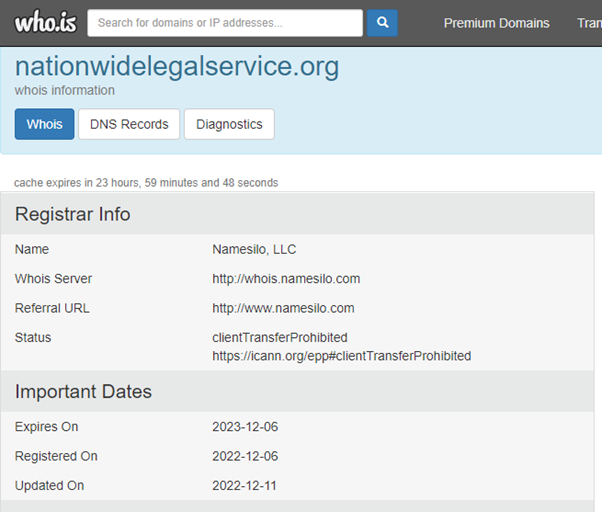
Lustgasm
Lustgasm themselves seem an equally odd company – they were founded by Elena Johnson and James Hamilton, and their site was registered in December 2021, though their first post was apparently published on April 26th, 2021. That first post was a review of BDSM flogging implements, including Click-To-Buy links for each of the recommended products, and an offer code (“BADUMTISH”, in case you’re interested) that would secure a 10% discount.
According to the About page of the website, Elena Johnson is a Sex Educator, Writer and Co-Founder of LustGasm, who originally became fascinated with the relationship between sexual fulfilment and our overall well being whilst studying psychology” and James Hamilton has “always been passionate about optimising my body, and finding ways to improve my experiences in life, and having a good sex life is top of my list of priorities. Over the years, I have spent countless hours researching supplements, exercise and more, but analysing sex toys and products for LustGasm is by far the most fun!”

Elena and James set up Lustgasm’s Twitter in Feb 2022, but have only tweeted 16 times, they follow nobody and have 2 followers. Hardly a prolific output for a would-be sex toy influencer.
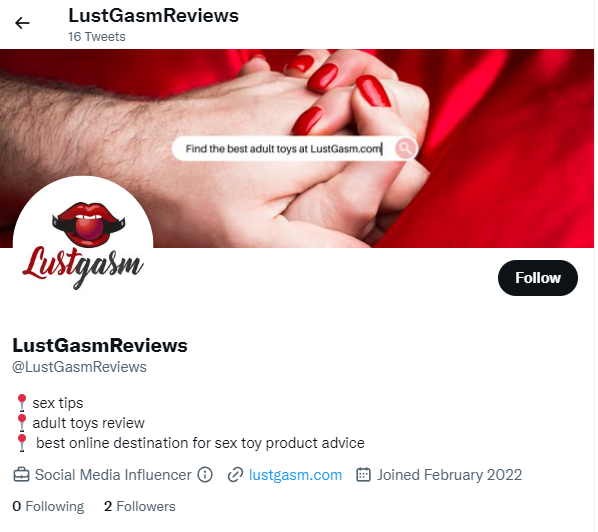
Their Instagram footprint has fared little better, with just 20 posts, and 2 followers.
What is particularly strange is that, despite such little penetration into the online sex toy review industry, and despite having come to the scene so recently, they – and Elena especially – are quoted giving sex advice in a number of places around the internet, dating back as early as 2017. For example, there’s an article of valentine tips from Grace Carlson at Actively North West from February 13th 2020 that includes:
if you’re thinking of “adding a distinctly grown-up element” to your day, check out what Elena Johnson has to say on Lust Gasm. You can never say no to some additional advice!.
And in the August 5th, 2019 blog from Mama The Fox about relationship advice to give your teenage daughter, they write:
You can’t shelter your daughter forever, but you can arm her with knowledge, wisdom, confidence, and values to face the wider world. If you’re not too worldly yourself, remember you could always point her towards the advice of someone like Elena Johnson from LustGasm, who talks about the “need to relax, and get into the right mental state” before doing anything with boys.
What could be happening here? How can Elena Johnson be someone whose name has been around the sex advice world in conjunction with the business name LustGasm for at least three or four years, if LustGasm itself is so recent? That’s where things get even more interesting.
Astroturfing in action
To make sense of this confounding timeline, we need to get a little more technical – rather than relying on the dates that appear besides articles and posts in Google search results, we can set the date parameter in Google to exclude any article from 2018 onward, and then search for the term “LustGasm”. Do that, and Google finds no mention of LustGasm anywhere online.
The earliest mention I could find of LustGasm as a business name appeared on the question-and-answer site Quora, in a post that was originally dated from 2017, in which a questioner asks for good names for a sex shop, and a web developer named Matthew Davis responds to say:
“Hmmm. This is a good question. I kept thinking on a catchy name that would still look like a humble store but of course, can fulfill one’s wildest dreams. The names that I came up are Wild Store – they might think this is an animal shop (LOL!). If you need some ideas for the toys you want to sell, please check the link below.”
And the link below is to Lustgasm. Except, the post was updated 9 months ago to add the LustGasm link. In fact, Matthew seems to be quite the evangelist for LustGasm, as he has posted 24 answers in total to Quora, and in March 2022 he went back and edited around half of them to remove the existing link and replace it with a link to LustGasm’s website. In each of those cases, Matthew’s original link, as posted when his reply was first posted, was to a website called “Badumtish” – which, you may recall, is the discount code on that first post from LustGasm.
The upshot of all of this is that when you do a Google search for Lustgasm, what you see in the results is a post on Quora – a well-known site with good brand recognition – recommending Lustgasm.
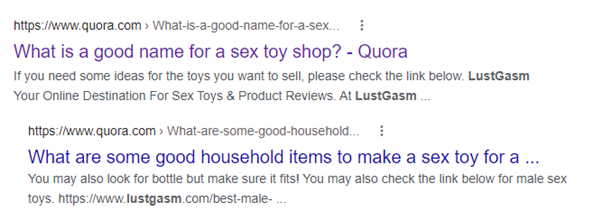
And what about those mentions of Elena Johnson’s advice from 2018 and 2020? How could they have preceded the creation of the LustGasm site? If you take those blog posts and put them into the Wayback Machine, you find that when they were first posted, neither Actively North West nor Mama The Fox mentions Elena Johnson or LustGasm at all. They’ve been subsequently edited to insert her into history, and to give her a realistic looking past.
As best as I can tell, not only is LustGasm a completely fake company, but so is Nationwide Legal Services, and more than likely so are the blogs of Actively North West and Mama The Fox – likely all set up by the same person, who may or may not be web developer Matthew Davis.. or that may be a fake name and fake profile too.
The point of all this
You might be wondering what our Elena/Julia/Janet/Matthew faker gets out of all of this. The answer lies in that first LustGasm blog post – the links to products, and the discount code that users can enter to get 10% off their flogger of choice. That discount code is an affiliate marketing code, and any user who visits the LustGasm site and uses that code to gain their discount will result in a small commission to the site owner.
Given that the commission is likely to be relatively small, the key for Elena/Julia/Janet/Matthew is to maximise the number of people who come across their discount code, which means to gain maximum traffic to the site. Essentially, everything else that’s gone on is to exploit the way search engines rank and prioritise websites.
Search engines – by which we obviously mean Google – try to send users to sites that are relevant. To work that out, they look at a range of proxy metrics – one of which used to be “how many other sites link to this site?”. If it’s a good site, lots of people will link to it. But this incentivised people to devise exploits, like creating link farms: pages filled with links, that only exist to provide backlinks to sites. So Google changed up, and began to penalise sites that linked to a large number of other sites, without providing content of their own. No problem, the affiliate marketer simply creates a network of phoney sites to link to each other, and exploit Google’s reward system.
So Google changed up again, and decided that what’s important isn’t the quantity of links, but the quality of the site that links to your site. That quality would be measured in various ways: age, traffic, type of content, those kinds of things. So how do you exploit that? You need to get high quality sites to link to you. That’s not easy, because those sites are by definition better run than the phoney throwaway sites people can create in a moment.
One way to get backlinks into reputable sites would be to find sites that have regular blogs, and pose as a would-be writer and offer them content that you can tailor to what they do. Find a food blog, write a food article, include a link to your site along the way, and the Google juice will flow. Here at the Skeptic, we get at least five emails a day from would-be marketers. We don’t accept them, even when they offer to pay to place articles.
However, there are other ways to pressure sites into linking to your affiliate marketing site, and this is where our many-hatted scammer comes in. Simply pose as a fake law firm and threaten copyright infringement, and demand that your link get added to their site. A lot of people will get too scared to question it, and will simply add the link, after all, it’s just a link. Like the online women’s magazine “The C Word” did on their April 2021 article “Common Myths About Female Masturbation debunked”, which credits its header image to LustGasm. Or like TimeOut did, with their August 2021 article “The best online sex shops that deliver to Brisbane” – where the header image is credited to the royalty-free image site Unsplash… and to LustGasm. This latter example is particularly impressive: TimeOut clearly knew the source of their header image, and knew that it is a royalty-free image website, but they still decided to grant a copyright credit to a scam site rather than investigate it for a moment.
And this all might sound like a lot of work, but it is easier than you’d think. The Nationwide Legal Services site is, in all, maybe a dozen pages. All of the images are stock images – in fact, I traced many of the images back to Shutterstock, a paid-for image library. In all likelihood, our legal letter came from a phony law firm who themselves were committing copyright violation.
For something more bespoke and less traceable – say, the images of your imagined lawyers and sex bloggers – you can simply visit https://thispersondoesnotexist.com/, the random face generator, and find a face that looks realistic. That’s why they all have that same uncanny valley quality. This might be why Elena, James, Julia, Matthew and each of Julia’s legal colleagues can’t be found anywhere else online.

To populate your fake legal site or fake sex blog, you can either grab copy from legitimate sites in those areas, or you could use a text generator like ChatGPT to fill your pages.
Crucially, if and when your whole scam gets uncovered and your fake legal company has so many online warnings that the cover is no longer credible, you can simply change the company logo, the names of the lawyers, the stock images on the pages and the URL of your site, and hey presto, “Thornton Sims” becomes “Nationwide Legal”. You can register a new sex toy review site (moving from “BadumTish!” to “LustGasm”), taking over the old blog content you’d put together, and start again.
Most interestingly of all, you can then go into the various other places you’d posted to give your sites credibility – like Quora, or the astroturf sites you created – and update the posts and articles to refer to your new expert and your new scam business. Those sites are kept at arms’ length from the scam itself, and in some cases they’re posts on legitimate and recognisable websites, so when your main scam company gets burned, those posts don’t burn with them. Even better, once edited, those posts retain the original publishing dates, even though the names and recommendations get updated – giving your freshly-minted scam website the illusion of a history and a footprint.
Now, none of this is to say that you should ignore DMCA notifications. But if you do get asked to add a credit to a weird company for an image you’re pretty sure is royalty free, or if you get offered money to accept an article for your blog, maybe give it all a second thought, because it might just be a scam.



